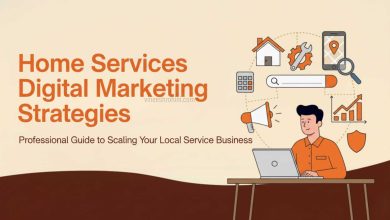Manufacturing Marketing : Proven Tactics to Try & Real Examples to Spark Ideas – Comprehensive Guide 2025
Manufacturing Marketing : The manufacturing industry has evolved dramatically over the past decade. Once dependent on traditional outreach, trade shows, and offline networking, manufacturers today operate in a much more competitive and digitally connected marketplace. Industrial buyers conduct more than 70% of their research online before ever contacting a supplier. Engineers, procurement teams, distributors, and B2B decision-makers now expect manufacturers to have a strong digital presence, transparent product information, and an authoritative brand identity.
Table of Contents
This shift has made manufacturing marketing essential—no longer optional. To grow in 2025 and beyond, manufacturers must adopt modern marketing strategies that attract the right buyers, educate them effectively, nurture long-term relationships, and position their company as an expert in their industry.
This comprehensive Guide blog explores the most effective manufacturing marketing tactics, provides real examples, analyzes key trends, and outlines actionable methods to improve visibility, lead generation, and sales.
Understanding Manufacturing Marketing in 2025

Manufacturing marketing involves promoting industrial products, machinery, components, tools, and technical solutions to engineers, B2B buyers, OEMs, contractors, wholesalers, and corporate procurement teams. Unlike B2C marketing, manufacturing buyers:
- Require technical specifications
- Seek reliability and long-term value
- Evaluate safety and compliance
- Value consistency and proven results
- Depend on detailed documentation
- Take longer decision cycles
This means manufacturing marketing must be highly informational, data-driven, and trust-building.
Top goals of manufacturing marketing include:
- Generating high-quality B2B leads
- Educating customers & distributors
- Growing awareness and market share
- Differentiating from competitors
- Supporting sales teams with content
- Strengthening brand credibility
The modern buyer wants to see proof—not just claims.
Also Read : Build Brand Awareness : Strategies to Boost Visibility : A Comprehensive Guide 2025
Why Manufacturing Companies Need Strong Marketing
Manufacturers who embrace digital marketing see enormous advantages:
1. Industrial buyers research online
Engineers search for:
- CAD files
- Product diagrams
- Operational instructions
- Industry certifications
- Case studies
- Pricing details
Without these assets, buyers may choose a competitor.
2. Manufacturers need differentiation
Many industries—automotive components, steel fabrication, packaging, chemicals—are crowded. Marketing helps highlight your strengths.
3. Long sales cycles require nurturing
B2B buyers need consistent follow-ups and education. Digital marketing automates this process.
4. Digital presence increases trust
Your website, LinkedIn, videos, and technical content act as proof of expertise.
5. Marketing supports distributors
Dealers and channel partners rely on strong brand content to close sales.
Top Manufacturing Marketing Tactics to Try in 2025
Below are the most effective strategies that successful manufacturing companies are using to grow.
1. Build a High-Authority Manufacturing Website

A manufacturing website is not just an online brochure; it is your most important marketing asset. Industrial buyers want:
- Product catalogs
- Technical specifications
- CAD drawings & layouts
- Certifications (ISO, CE, etc.)
- Case studies
- Industry applications
- Compliance details
- Videos showcasing manufacturing processes
A powerful industrial website includes:
Clear navigation
Organize product categories and industries served.
Detailed product pages
With dimensions, tolerances, materials, compatibility, and use cases.
Downloadable resources
3D models, brochures, datasheets, manuals, and diagrams.
Conversion-focused elements
Inquiry forms, request-a-quote (RFQ) buttons, call-back options.
SEO-optimized structure
So engineers find your solutions through search engines.
2. Manufacturing SEO (Search Engine Optimization)
Manufacturing SEO helps potential customers find you when they search for terms like:
- “CNC machining services”
- “Food-grade stainless steel valves”
- “Industrial pump suppliers”
- “Automotive component manufacturers”
SEO for the manufacturing industry involves:
Technical SEO
Fast loading speed, mobile compatibility, structured data.
On-page SEO
Optimized product pages, keyword-rich descriptions, H1/H2 structure.
Content SEO
Blogs, guides, industry updates, FAQs.
Local SEO
Essential for regional manufacturing units.
Long-tail keywords
Manufacturers thrive on specific keyword phrases like “aluminum die-casting for automotive engines.”
SEO is crucial because B2B buyers often avoid sales teams until the final stage—they prefer self-driven online research.
3. Content Marketing for Manufacturing Companies
Manufacturing content marketing builds trust and positions your company as an industry expert. Engineers appreciate detailed, technical information—not sales pitches.
The most effective forms of content include:
Technical blog posts
Example:
“Differences Between Hot Forging and Cold Forging”
In-depth industry guides
Example:
“Complete Guide to Pharmaceutical-Grade Stainless Steel Tanks”
How-to articles
Example:
“How to Choose the Right Conveyor System for Food Processing”
CAD files and diagrams
Engineers love downloadable files they can use in designing.
Whitepapers
Research-backed documents help enterprise clients.
Case studies
Show how your product solved real problems.
Comparison content
Example:
“Aluminum vs Titanium Parts for Aerospace Manufacturing”
Video tutorials
Machine demos, assembly procedures, safety instructions.
Content is the backbone of manufacturing marketing because it builds authority and gives buyers confidence.
4. Email Marketing & Lead Nurturing
Manufacturing buyers rarely make immediate decisions. Email marketing nurtures them through:
- Product updates
- Technical insights
- Case studies
- New certifications
- Company announcements
- Industry compliance updates
Effective email sequences include:
Welcome Series
Introduce your capabilities & product range.
Problem-Solution Emails
Explain how your products address specific challenges.
Product-Focused Emails
Launches, upgrades, manufacturing innovations.
Lead Nurturing Drip Campaigns
Gradually educate prospects until they are ready to buy.
Distributor & Partner Newsletters
Strengthen relationships with channel networks.
5. LinkedIn Marketing for Manufacturing Brands
LinkedIn is the most powerful platform for manufacturing marketing because:
- Engineers are active
- Industrial buyers research suppliers
- B2B executives make purchase decisions
- Distributors follow brands
Best LinkedIn tactics include:
- Sharing company updates
- Posting manufacturing process videos
- Publishing industry insights
- Employee branding
- Running B2B ads targeted at engineers
- Participating in industry groups
Companies that post regularly become trusted voices in their sector.
Buy Now : Ecommerce Website
6. Industrial Videos & Factory Showcase Marketing
Manufacturing buyers love videos because they demonstrate quality and capability.
Types of effective manufacturing videos:
- Factory tours
- Machine demonstrations
- Production process videos
- Quality testing videos
- Assembly workflow videos
- Safety compliance walkthroughs
- Customer success stories
Videos build transparency and trust—key factors in manufacturing decisions.
7. Case Studies & Success Stories
Manufacturers win deals by proving results.
A strong case study includes:
- Client background
- The problem
- Your solution
- Technical details
- Results with measurable data
- The final outcome
Case studies turn technical expertise into real-world value.
8. Trade Shows + Digital Follow-Up
Trade shows remain important, but manufacturers often miss the biggest opportunity: follow-up marketing.
After events:
- Upload event photos
- Send email recaps
- Publish LinkedIn updates
- Share demo videos
- Retarget attendees with ads
A strong trade-show strategy blends offline meetings with digital reinforcement.
9. Paid Ads for Manufacturing Companies
Manufacturers can use paid campaigns on:
- Social Media Ads
Examples of effective ad targeting:
- “Buy industrial automation parts”
- “OEM component suppliers”
- “Heavy machinery parts manufacturer”
Paid ads support ASO (audience-source optimization), brand visibility, and lead generation.
10. Distributor and Dealer Marketing Support
Manufacturers grow faster when they:
- Provide marketing materials
- Offer co-branded campaigns
- Train partners
- Share product videos
- Provide ready-made brochures
- Supply technical manuals
This strengthens sales networks and ensures consistent brand messaging.
Examples to Spark Manufacturing Marketing Ideas

Here are real-world style examples to inspire creative strategies:
Example 1: CNC Machine Manufacturer – Technical Explainer Series
A CNC manufacturer created:
- 15-minute machine demo videos
- CAD file downloads
- Tooling compatibility guides
- Maintenance videos
Result: 40% increase in engineering inquiries.
Example 2: Industrial Pump Manufacturer – SEO Education Strategy
A pump company published:
- “How to Choose the Right Pressure Pump”
- “Pump Failure Troubleshooting Guide”
- “Pump Materials Comparison Chart”
Result: 300% increase in organic traffic and 2x more RFQs.
Example 3: Steel Fabrication Unit – LinkedIn Factory Showcase
The company shared weekly posts:
- Welding processes
- Laser-cutting demonstrations
- Quality checkpoints
Result: Stronger brand authority and better B2B leads.
Conclusion

Manufacturing marketing is no longer about catalogs and cold calls; it is about building trust through expertise, digital content, and visibility. In 2025, manufacturers who embrace digital transformation, modern marketing strategies, and data-driven campaigns will lead their industries.
Buy Now : Ecommerce Website
By combining a strong website, SEO, content marketing, LinkedIn branding, video storytelling, and strategic paid campaigns, manufacturers can attract qualified leads, shorten sales cycles, strengthen distributor partnerships, and increase long-term revenue.
In a competitive global market, the manufacturers who communicate value—and prove it—are the ones who win.
Disclaimer : This blog is for informational and educational purposes only. Manufacturing marketing results vary depending on industry, competition, market conditions, and execution quality. Businesses should conduct thorough research before implementing any marketing strategy.



